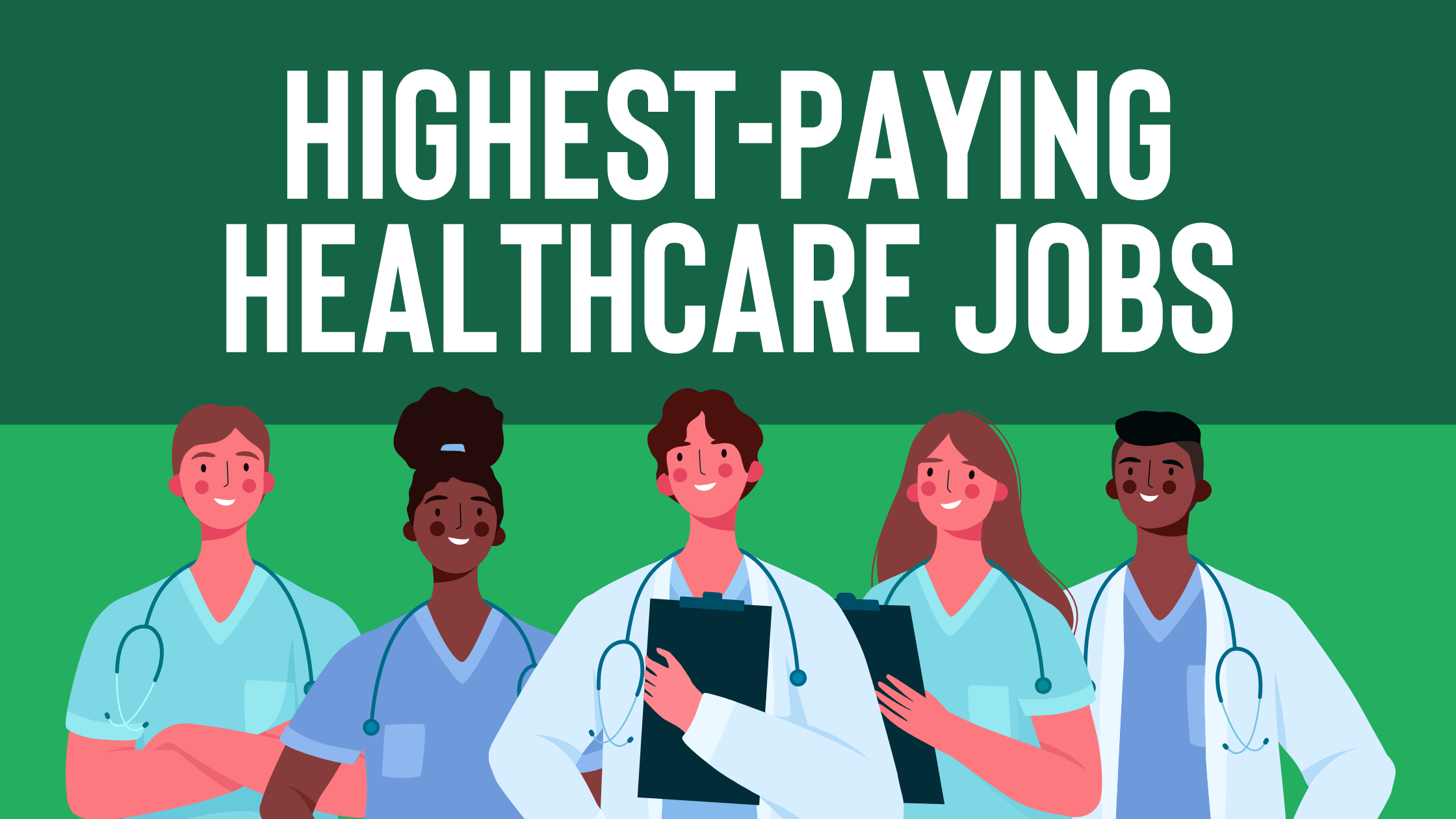

Healthcare is one of the largest industries in the U.S. and is projected to exceed 8.6 trillion dollars by 2033, according to the National Health Expenditures (NHE) data from The Centers for Medicare & Medicaid Services (CMS).
It also has some of the highest-paying jobs, with six-figure salaries paying as much as $1.5M for surgeons, $525,000 for oncologists, $500,000 for dentists, and $475,000 for emergency medicine physicians, which are the highest-paying healthcare jobs recorded in our Salary Database. With the amount of responsibility and student loans that many of these professionals have, the pay makes sense.
?
Even if you don’t want to be a doctor, there are still other high-paying healthcare careers to choose from, such as nurse anesthetists with salaries as high as $350,000 recorded in our Salary Database.
There is a ton of growth potential in this industry, with as much as a 40% projected job growth between now and 2033 for some roles, making it a great option for those who want to work in medicine.
Key points:
- Some of the highest-paying healthcare jobs are surgeons, oncologists, and emergency medicine physicians.
- You don’t have to become a doctor to land a high-paying healthcare job.
- The highest-paying healthcare jobs that don’t require doctoral degrees are nurse anesthetists and physician assistants.
- Browse thousands of more publicly shared salaries on our Salary Database.
10 Highest-Paying Healthcare Jobs That Pay Over $100k
We’ve identified 9 top-earning jobs in the healthcare industry using salary data from the past 3+ years of interviews, data we’ve collected in our Salary Database, and job data from the U.S.Bureau of Labor Statistics (BLS) Occupational Outlook Handbook.
Here’s a sneak peak of a few medical salaries from our recent interviews:
?
You can find all of the highest healthcare salaries we recorded by searching for any of the below positions in our Salary Database. Don’t forget to join and add your salary too!
1. Surgeon
Median salary: $239,200 per year or more
Highest salary recorded in our Salary Database: $1,500,000 per year
A “surgeon” is a catch-all job title for a person who performs surgeries, but there are dozens of different types of surgeons. For instance, general surgeons perform general surgeries like abdominal and some emergency surgeries, orthopedic surgeons operate on the musculoskeletal system (bones, joints, etc), neurosurgeons operate on the brain, and oral surgeons operate on anything in the mouth. We found an oral surgeon in our Salary Database that makes $1.5M at NADG, which makes that the highest healthcare salary in our database!
Those aren’t the only areas you can specialize in either. Other types of surgeons include pediatric surgeons, plastic surgeons, trauma surgeons, transplant surgeons, cardiothoracic surgeons, vascular surgeons, and gynecologic surgeons.
Job outlook (2024-2034): 3% increase in job growth
Education needed: Doctoral or medical professional degree, 3 to 7 years of residency, and passage of the United States Medical Licensing Exam (USMLE).
2. Oncologist
Median salary: $239,200 per year or more
Highest salary recorded in our Salary Database: $525,000
Oncologists specialize in diagnosing and treating cancer. They manage a patient's cancer care throughout the course of the disease, including diagnosis, treatment, follow-up, and palliative care. Many oncologists are also involved in researching and learning about new cancer treatments. Without them, many cancer patients would lose hope.
Oncologists typically specialize in one of three areas: medical oncology, radiation oncology, or surgical oncology. They’re required to have a strong understanding of cancer biology and treatment modalities, as well as be able to manage any side effects. Depending on their speciality, their required years of residency may change but typically fall within 3 to 7 years. After that, they can become board-certified.
Job outlook (2023-2033): 4% increase in job growth
Education needed: Doctoral or medical professional degree, 3 to 7 years of residency, and passage of the United States Medical Licensing Exam (USMLE). Need help paying for school? Check out our top student loan picks to compare options and find what fits your future.
3. Emergency Medicine Physician
Median salary: $239,200 per year or more
Highest salary recorded in our Salary Database: $475,000
Emergency medicine physicians specialize in treating patients with acute illnesses or injuries that require urgent care. If you’ve ever been to the emergency room, those are the doctors that you see. They typically work in high-pressure environments, such as hospital emergency rooms or trauma centers, and their role is to provide immediate medical attention to patients of all ages and with a wide variety of conditions.
Before they can become full-fledged doctors, emergency medicine physicians need to complete 3 to 4 years of residency before becoming board-certified. Even though this position has the potential to be high-earning, residency isn’t. We interviewed an emergency medicine resident who is currently earning $66,000 in her 2nd year of residency. Keep this in mind when exploring different medical roles.
Job outlook (2023-2033): 4% increase in job growth
Education needed: Doctoral or medical professional degree, 3 to 4 years of specialty training in emergency medicine, and passage of the USMLE.
?
4. Anesthesiologist
Median salary: $239,200 per year or more
Highest salary recorded in our Salary Database: $450,000
If you’ve ever had to have a surgery done, remember when you were knocked out cold by the lovely medical professional who had you count down from 100? They were an anesthesiologist, who are medical doctors who specialize in administering anesthesia and managing pain. Because of them, your safety and comfort is ensured during and after medical procedures – and are responsible for your sound surgical slumber.
?
Anesthesiologists work across various settings, including operating rooms, labor and delivery units, intensive care units (ICUs), and pain management clinics. You may think this profession has zero to no work-life balance, much like several doctors, but that isn’t always the case. We interviewed a cardiac anesthesiologist who makes up to $700,000 a year, has 4 kids, and has never missed anything of importance. They place a high importance on that balance.
Job outlook (2023-2033): 4% increase in job growth
Education needed: Doctoral or medical professional degree, 4 years of residency, and passage of the USMLE.
?
5. Nurse Anesthetist (CRNAs)
Median salary: $212,650 per year
Highest salary recorded in our Salary Database: $350,000
Nurse anesthetists, or Certified Registered Nurse Anesthetists (CRNAs), are advanced practice nurses who specialize in administering anesthesia. Their main role is providing anesthesia care to patients undergoing surgical, medical, or diagnostic procedures.
The main difference between CRNA’s and anesthesiologists is their education and training. CRNAs are advanced practice nurses with specialized training in anesthesia, while anesthesiologists are medical doctors who complete a medical degree and a residency in anesthesiology. Anesthesiologists typically oversee anesthesia care in more complex cases and have a broader scope of medical practice compared to CRNAs.
Job outlook (2023-2033): 40% increase in job growth
Education needed: New nurse anesthetists will be required to have a doctoral degree by 2025, according to the Mayo Clinic College of Medicine and Science. We interviewed a CRNA who makes $280,000 a year and started out as a registered nurse (RN), worked in the ICU for 7 years (she said the minimum requirement was 1 year), then went to anesthesia school.
Pro tip: If you want to skip med school, certified anesthesiologist assistants make just as much with a master's degree.
?
6. Dentist
Median salary: $170,910 per year
Highest salary recorded in our Salary Database: $500,000
As much as you may hate going to the dentist, those pearly whites of yours have a different opinion. Dentists are who take care of your oral hygiene and overall health. In addition to caring for their patient’s teeth, they also treat conditions related to the gums and mouth.
Dentists aren’t the only high-paying dental role out there. Oral surgeons, orthodontists, and prosthodontists are other possible specialties to explore – with oral surgeons making a median salary of $239,000, according to the BLS. Dentists have the option to become oral surgeons, but not all dentists are oral surgeons.
Job outlook (2023-2033): 5% increase in job growth
Education needed: Doctor of Dental Surgery (DDS) or Doctor of Dental Medicine (DMD) degree and passage of the Integrated National Board Dental Examination (INBDE).
Also read: How to Start a Career in Dentistry (+ Tips From Real Dental Professionals)
?
7. Pharmacist
Median salary: $136,030 per year
Highest salary recorded in our Salary Database: $177,000
While doctors write prescriptions, pharmacists fill them. Pharmacists are healthcare professionals who specialize in the safe and effective use of medications. They play a vital role in patient care by ensuring that medications are prescribed and used properly, providing valuable information to patients and healthcare providers, and contributing to public health initiatives.
A pharmacist's salary may vary depending on where they work. Those working in ambulatory healthcare services make a median salary of $150,110, while those who work in hospitals make $141,880, according to the BLS. Pharmacists that work at your local drug store make a little less at $131,290. We interviewed a pharmacist that makes $100,000 a year working in a hospital.
Job outlook (2023-2033): 5% increase in job growth
Education needed: A PharmD, or Doctor of Pharmacy and passage of the North American Pharmacist Licensure Examination (NAPLEX).
8. Optometrist
Median salary: $131,860 per year
Highest salary recorded in our Salary Database: $380,000
If you’re having trouble seeing clearly and think you might need glasses or contacts, an optometrist is who you go to see. Optometrists are doctors who specialize in eye care and vision health. They perform eye examinations, diagnose vision problems, and provide treatments, including prescribing corrective lenses and managing certain eye diseases.
?
Where optometrists end up working has a lot to do with their pay. Those who work at outpatient care centers make a median salary of $182,200 a year, while those who work in offices make a lower salary of $125,140, according to the BLS.
Job outlook (2023-2033): 9% increase in job growth
Education needed: Doctor of Optometry (O.D.) degree and passage of the Optometry Admission Test (OAT). We interviewed an optometrist that spent 8 years in schooling and currently makes $143,000 a year.
?
9. Physician Assistants
Median salary: $130,020 per year
Highest salary recorded in our Salary Database: $165,000
Have you ever made a doctor appointment and were instead scheduled with your doctor’s physician assistant? There’s a good reason for that.
Physician Assistants (PAs) practice medicine under the supervision of physicians. They play a vital role in providing patient care in various medical settings, including hospitals, clinics, and outpatient facilities. When doctors aren’t available, they help handle the load by consulting with patients during routine appointments and some specialty care.
?
PAs in outpatient care centers tend to make the most, with a median salary of $141,050 recorded by the BLS. We interviewed a PA who currently makes $130,000 a year with 10 years of experience.
Job outlook (2023-2033): 28% increase in job growth
Education needed: Master's degree and passage of the Physician Assistant National Certifying Examination (PANCE).
?
10. Veterinarian
Median salary: $119,100 per year
Highest salary recorded in our Salary Database: $230,000
Our fur babies need doctors too. Veterinarians are continually growing in demand as the number of pets grows (and the necessary care needed for those cuties). So much so that the profession is projected to grow 19% by 2033, making it a great option for animal lovers.
It’s a career that allows you to spend your days with your favorite people – animals. You’ll be responsible for diagnosing and treating animals through preventative care, surgeries, and advising pet owners on animal health and wellness.
?
Even though it’s a great high-paying job, there can be a few downsides to it too. If you can’t handle seeing animals at their worst, then this may not be the job for you. You have to be someone who will be there to medically treat them no matter what. They’re counting on you!
Job outlook (2023-2033): 19% increase in job growth
Education needed: Doctor of Veterinary Medicine (DVM or VMD) degree at an accredited college of veterinary medicine.
How to Break Into High-Paying Medical Jobs
Breaking into some of the highest-paying healthcare jobs can be a tough feat to say the least. Doctors and surgeons require as much as 15 years of school and training for some specialties before they can practice on their own, and it isn’t cheap either. If you need help covering the bill, The Association of American Medical Colleges (AAMC) is a great resource for finding financial aid.
?
However, there are plenty of positions in the medical field that pay well and have lower barriers to entry, such as nurse practitioners who earn a median salary of $126,260 with a master’s degree as a minimum requirement. This is also one of the highest-paying in demand jobs of the future. The highest salary recorded for nurse practitioners in our Salary Database is $164,000 a year.
Radiation therapists and nuclear medicine technologists both fall above $90,000 median yearly salaries and only require associate degrees! Some of the highest-paying trade jobs also fall under healthcare, such as sonographers and radiology technicians.
Whatever role you wish to explore in medicine, spend a good amount of time shadowing higher-up professionals to get a good feel for what you really want to do. Maybe one day you’ll be the one to save our lives! 😷
Don’t forget to browse our other resources as you break into this field, including interview questions and answers to prepare for, salary negotiation scripts and myths, how to ask for a raise, and more!
Learn about more high-paying jobs:
- 8 Highest-Paying Creative Jobs That Pay $100k or More
- 10 Highest-Paying Government Jobs & How to Land Them
- 18 Highest-Paying Trade Jobs With Low Barriers to Entry
- 17 Highest-Paying Jobs Without a College Degree (All Pay Over $60K)
That wraps it up for this week. Until next time, stay awesome, stay strong, and keep advocating for yourself no matter what! I’m Daniella Flores, a former engineer turned writer and career researcher that’s appeared in TIME, CNBC, and Investopedia (among many others). I’m extremely passionate about workers' rights and financial freedom, so it’s a pleasure to be able to bring you this type of content through the Salary Transparent Street blog (thank you for the opportunity, Hannah!) You can also follow me on Linkedin. Chat soon!
If this guide helps you land a higher-paying job, let us know! Send us an email ➡️ hello@salarytransparentstreet.com
For more Salary Transparent Street resources:
- Want to join the movement? Explore thousands of individually reported salaries nationwide across all industries in our Salary Database!
- Do you know if you're being underpaid? Take our free quiz to find out!
- Need help determining your market rate? Download our free Market Research Guide to learn what you should be making.
- Need help negotiating your salary? Download our free Salary Negotiation Guide!
- Follow us on TikTok, Instagram, Facebook, YouTube and LinkedIn for daily pay transparency interviews and career news you can use!
- Subscribe to our weekly newsletter for news updates, professional deep dives, learning opportunities, and more!


